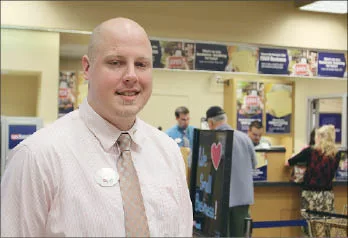U.S. Bank branches out to develop its future managers
Leader training program is slated to start in August, continue for next two years

To develop the next generation of branch managers, the Spokane region of U.S. Bank is going to try something it hasn't done in a generation or so: recruiting them and training them extensively in-house.
The bank is launching the new initiative, called the Leader Development Program, late this summer, says Linda Elkin, Spokane-based regional president at U.S. Bank. The first three candidates are scheduled to start training in August. Trainees who complete the 24-month period are expected to be placed as branch managers at one of the bank's 15 branches in the Spokane area.
The candidates, Elkin says, are to receive thorough training on each aspect of the bank's operations. In return, she says, the bank will have three employees who understand each aspect of operating a branch and can fill a position for which it isn't always easy to find the right fit.
"It's tough to find the right candidate who has the full complement of skills to run a small financial services company, which is essentially what a branch is," she says.
In many ways, Elkin says, the program harkens back to an earlier generation that received extensive training from the bank and its predecessor institutions at the beginning of their careers. Many of the employees who have been with U.S. Bank for 30-plus years received that kind of training early in their careers, she says.
"They were able to join the bank in a management-training environment," Elkin says. "I'm really pleased that the bank is going back to what made a lot of sense but maybe wasn't feasible at times in the past 20 years."
The three trainees due to participate in the program are recent Gonzaga University graduate Schylur Edelman, recent Whitworth University graduate Melinda Leavitt, and Jason Paull, who graduated from Western Washington University two years ago.
Paull currently works as a personal banker at a U.S. Bank branch inside a Safeway supermarket on Spokane's North Side. Elkin says one stipulation of the program is that one of its trainees must be hired from within the organization, and she says he was the successful candidate chosen from the internal search.
Paull, who has been with U.S. Bank for about a year, says, "I want to advance my career, and being a branch manager is one way to do that."
Elkin says the two recent college graduates were selected after an extensive recruiting and interviewing process that involved all of the Inland Northwest universities. The successful candidates both had interesting extracurricular activities: Edelman played volleyball for Gonzaga, and Leavitt was heavily involved in student government at Whitworth.
Moving forward, Elkin says, the trainees will start out as tellers but will move into rotations learning other areas of the banking: commercial lending, private banking, and a number of others. In addition to working at locations throughout the Spokane region, the trainees will work at times in North Idaho, under the tutelage of Elkin's counterpart in Coeur d'Alene, Susan DuBois.
Managing a branch successfully involves a mix of competency in business fundamentals and the intangible skills involved in effectively managing people.
At U.S. Bank, she says, branch managers' work performances are evaluated in a number of ways: growth in net deposit accounts, growth in consumer and small-business loans, and effectiveness in educating the bank's customers on new programs or technologies, such as mobile banking. Also, she says, the bank conducts weekly polls to gauge clients' experiences.
"At the end of the day, they are judged on all of those things," she says.
The Leader Development Program is one U.S. Bank has used in recent years in metropolitan markets such as Minneapolis and San Francisco. Elkin says Spokane and Reno, Nev., are the first next-tier markets—what U.S. Bank refers to as community banking regions—in which the bank is rolling out the program.
"It's quite a compliment to our region that the bank wants to invest in its future leaders here," she says. "They certainly see Spokane as a growth region."
Related Articles


_c.webp?t=1763626051)
_web.webp?t=1764835652)

